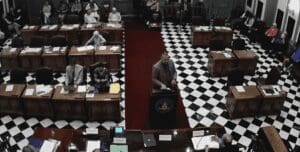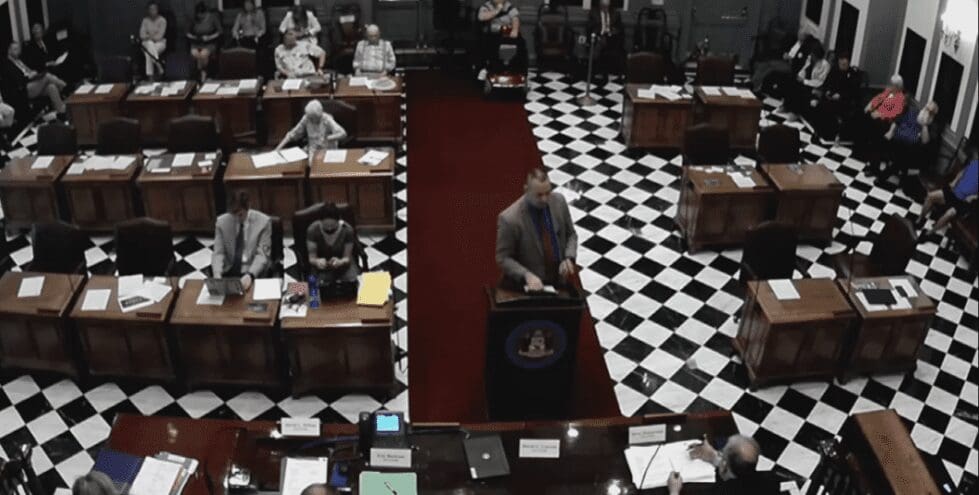

Two bills seeking to strip DNREC of regulatory controls on electric vehicles gets cold reception.
Two Republican bills that would stop DNREC from implementing an unpopular electric vehicle mandate failed in House and Senate committees.
Senate Bill 96, sponsored by Sen. Brian Pettyjohn, R-Georgetown, would forbid the Delaware Department of Natural Resources and Environmental Control DNREC from making any rules or regulations that would restrict the sale of gas-powered vehicles.
House Bill 123, sponsored by Rep. Mike Ramone, R-Pike Creek, has almost the exact same language as Pettyjohn’s bill, except that Ramone’s bill retroactively applies starting Mar 1, 2023.
SB 96 was heard Wednesday in the Senate Environment, Energy & Transportation Committee, and HB 123 was heard in the House Natural Resources & Energy Committees.
Senate committees don’t vote publically on bills. Members sign the bill and the results are reported on the state’s online bill trackers. At 5:15 p.m. Thursday, 24 hours after the hearing, the results still were not reported online.
In the House hearing, the bill failed 5 to 4, but Heffernan agreed to get the votes of everyone on the committee because five members were absent on a day crowded with hearings. About 5 p.m. Thursday, a notice went up that the bill didn’t have enough votes to be released.
Neither bill requires a fiscal note. Both have the same 20 additional sponsors and cosponsors, all Republicans.
Related Story: Car dealers: So far, electric vehicles not popular in Delaware
The Republicans, dismayed that DNREC was handed far-sweeping powers under an executive order from Gov. John Carney, are upset that it will phase out the sale of gas-powered cars by 2035.
Pettyjohn said looking at the 4,799 public comments submitted to DNREC on the proposed regulation, 93.5% were against it.
That followed several town halls that Republicans held in April and in May encouraging people to submit comments.
“The bottom line of this is consumer choice,” Pettyjohn said. “Saying at some point in time, the next two years that manufacturers must deliver 35% of their stock has to be electric regardless of what the consumer demand is, that’s a big thing. If the consumer demand still isn’t there, what then?”
Pettyjohn said he’s not against electric vehicles, but feels they don’t last long enough on the road, are too expensive and that there aren’t enough charging stations for the idea to be viable yet.
Sen. Laura Sturgeon, D-Hockessin, asked Pettyjohn why they shouldn’t implement the change if by doing so they would signal to car dealers that Delaware is supportive of electric vehicle infrastructure.
“That will invite investment from private businesses to help build out our infrastructure,” Sturgeon said. “If we don’t signal by adopting a mandate…we could end up left behind.”
Pettyjohn responded, “I have seen a lot of private investment come to Delaware already for charging stations…So I will say private industry is already doing that. And especially since a lot of Delaware, and especially in the southern part, is a tourist destination.”
Sen. Trey Paradee, D-Dover, said that the cost of flat screen televisions have dropped, so it makes sense that as technology improves, electric vehicles also will drop in cost.
“If you go back 15 to 20 years ago, if you wanted a 60 inch plasma screen TV it was gonna cost you somewhere between $10 and $15,000,” Paradee said. “And you can go into Sam’s Club today and buy an 82 inch TV that has a far better picture, for 1,200 bucks now. And I think the same phenomenon inevitably will happen.”
Pettyjohn said he wants to see that happen with electric vehicles.
“You were talking about the TVs, a perfect example,” Pettyjohn said. “The market happened. Technology improved. You had innovation that happened…The market happened, there was no mandate. There was no timeline that manufacturers had to do it. The market reacted. Manufacturers followed demand.”
Sen. Eric Buckson, R-Dover, said there are a lot of uncertainties about what will happen with electric vehicles.
“So we go all in the next thing you know technology flips to hydrogen or something like that,” he said. “ Who knows.”
Emily Knearl, an external affairs advisor for the Nature Conservancy in Delaware, testified during the public comment period that they oppose Pettyjohn’s bill because of the necessity to adopt electric vehicles.
Related Story: 60 attend GOP’s Bellefonte town hall about electric vehicles
“The way that DNREC has set up the standard, 13 years until full implementation, that gives us plenty of time with the federal investments and a careful, thoughtful approach to EVs”, she said.”The Nature Conservancy is asking you to vote down this legislation.”
Perennial General Assembly public commenter Robert Overmiller supported the bill, saying that Delaware moving away from coal power has increased his electric bills by 30%.
In the House hearing, Ramone said legislators should be the ones who decide whether Delaware adopts the new regulation or not.
Car dealers should decide what cars are on their lots and how much they’ll cost, he said.
“All those discussions I do not think should be left to any particular secretary,” Ramone said. “I think it should be given to the people who were elected by the people in their areas.”
Rep. Deb Heffernan, D-Bellefonte, asked Ramone if this bill would limit the abilities of any other department. Ramone said it would only apply to electric vehicle regulation by DNREC.
Ramone said people get information from many places, and it’s disingenuous to imply that people got incorrect information.
“There were a lot of places for people to get information. To imply that 4,800 replies, and 10% like it and 90% don’t, but the 90% who don’t like it got bad information, I just think that’s disingenuous to a degree,” Ramone said. “I don’t know how people are getting their information.”
Rep. Madinah Wilson-Anton, D-Newark, said that not holding a town hall doesn’t mean legislators are unaware of what constituents want.
“I think it’s also disingenuous to … say that those you haven’t heard from don’t have an opinion to the contrary,” Wilson-Anton said. “My constituents have full time jobs. Some of them have multiple jobs. They don’t want me to come to them and ask them for miniscule things every single decision.”
Dustyn Thompson, director of the Delaware Chapter of the Sierra Club, said during the public comment period, that the club is against Ramone’s bill because it is an unnecessary change to a system that has worked well.
“What we’re doing here today is debating for both politically motivated reasons, and reasons born out of a misunderstanding of a process and drivers of this policy,” Thompson said.
Joe Fitzgerald, vice president of Government Affairs with the New Castle County Chamber of Commerce, said they support Ramone’s bill.
“We certainly acknowledge that there’s a substantial consensus among leading scientists that ZEVs have environmental benefits,” Fitzgerald said. “There are also potential socioeconomic consequences and other practical issues that need to be addressed…a vote by the general assembly we think would be the most appropriate route.”
Share this Post



